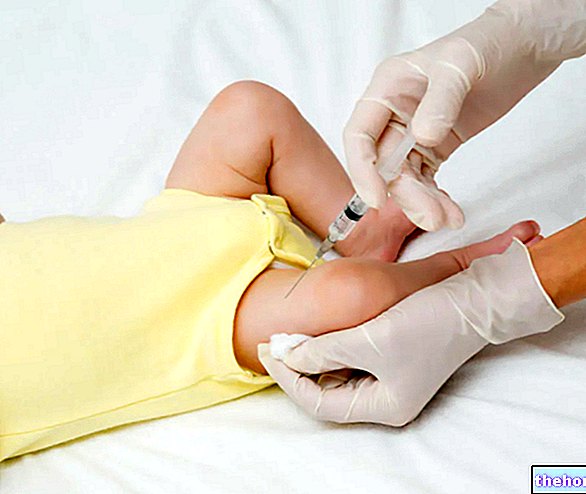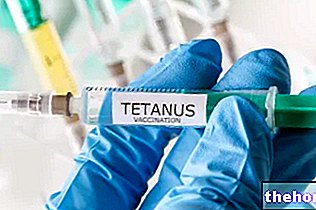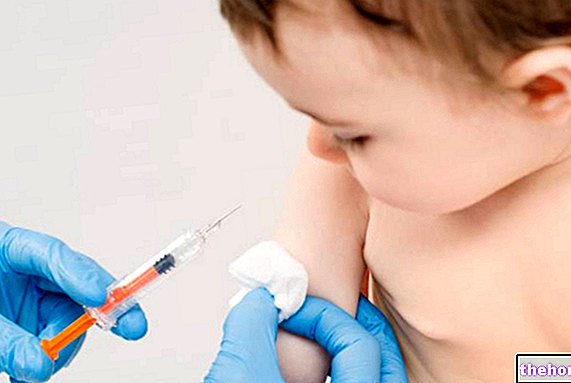Important premise
Until 2017, in Italy, vaccination against meningococcus was not compulsory, although it was recommended for healthcare professionals and strongly recommended for infants, conscripts, pilgrims traveling to Mecca and for all those traveling in high-risk areas, such as sub-Saharan Africa.
What changes from 2017
With the decree law on vaccination prevention for minors from zero to 16 years, approved on 07/28/2017 the vaccine against meningitis (vaccine againstHaemophilus Influenzae type b) has become mandatory for those born after 2001.
As for vaccinations against meningococcus C and meningococcus B, although not mandatory, they are offered by the Regions and Autonomous Provinces, based on the indications of the vaccination calendar relating to the year of birth:
- men born from 2012 to 2016 are offered free anti-meningococcal vaccinations C
- people born from 2017 are offered free meningococcal B, anti-meningococcal C and pneumococcal vaccinations.
For more information on mandatory vaccines in children see this article.
What is Meningitis
Meningitis is an inflammation of the membranes (meninges) that surround the brain and spinal cord. The disease is usually of infectious origin and can be viral, bacterial or caused by fungi.
The viral form (called aseptic) is the most common, but also the least severe.
Bacterial forms, on the other hand, can be fatal or lead to very serious complications (permanent neurological damage).
There are several types of pathogenic bacteria that can cause meningitis, including Neisseria meningitidis (meningocus), Streptococcus pneumoniae (pneumococcus) e Haemophilus influenzae type b (haemophile B or Hib).
To learn more, read: Meningitis Vaccine »
The Meningococcus ..
As we know, meningococcus - scientifically known as Neisseria meningitidis - is a pathogen involved in serious, potentially fatal diseases, such as meningitis and meningococcal sepsis.
There are several serotypes of meningococcus (currently 13 are known, but only 5 - A, B, C, Y, W135 and X - are clinically relevant, as they can cause epidemics and diseases that are dangerous for humans) In Italy, meningococcus C is the most aggressive serotype and occurs most frequently together with the B strain.
Why get vaccinated
Vaccination constitutes an effective defense weapon for the organism against pathogenic microorganisms, whose contagion could trigger exaggerated and fatal reactions. It should be emphasized, however, that vaccination does not simply represent a prophylactic measure towards oneself, but also towards others: the meningococcal vaccine (in this specific case) limits the spread of Neisseria meningitidis, minimizing the number of victims.
Another fundamental premise is the collaboration of the population: when a meningococcal infection is suspected, it is the moral duty of the patient to immediately report to the public health department, in compliance with the methods currently in use for the rapid reporting of meningococcal infection.
Meningococcal vaccination has given surprising results: in fact, a clear reduction in the number of healthy children with type C meningococcus has been observed and, at the same time, a marked decrease in the frequency of meningitis in NON-vaccinated subjects, an evident expression that the vaccine is in able to limit the spread of the pathogenic microorganism.
Vaccination or Prophylaxis?
All subjects exposed to a high risk of meningococcal infection, such as family members of a patient, should undergo chemoprophylaxis *, since the risk of contagion is extremely high on days when the symptoms of the disease appear.
Who Should Get Vaccinated?
There are three types of menngococcal vaccine:
- The conjugated vaccine against meningococcus C (it is the most frequently used and protects only from serotype C): it consists of the polysaccharide of the capsule of the "conjugated" bacterium on a protein that allows the induction of prolonged immune memory over time, in addition to the development The Ministry of Health recommends its administration to all newborns between the 13th and 15th month of life, and this vaccine is also suitable for all adolescents not previously vaccinated.
- The tetravalent vaccine that protects against ACY-W135 serotypes: is recommended for adolescents and people traveling to regions where the infection circulates. The conjugated version of this vaccine can be administered from 12 months of age, while the polysaccharide (containing only the polysaccharides of the capsule of serotypes A, C, Y and W135) is indicated over two years of age.
- The conjugate vaccine against meningococcus type B (protects only against this serotype): it can be used from two months of age, but currently there is no recommendation for the vaccination of all children on the national territory.
Conjugated vaccine for group C meningococcus
Medical statistics show that the patients most at risk of meningococcal meningitis are under the age of 25; beyond this period, in fact, the risk of contracting the disease decreases.
- Vaccination againstNeisseria meningitidis C (meningococcus C) is free and requires only one dose at 13 months. It is also recommended for susceptible adolescents. For those who were vaccinated as a child, the need for a booster in adolescence is being studied.
- Vaccination againstNeisseria meningitidis B (meningococcus B) provides different vaccination schedules for the number of doses, depending on the age at which vaccination begins. For example, a 4-dose schedule (3rd, 4th, 6th and 13th month of life) is generally followed before the baby is 6 months old. At the moment the vaccine is offered free of charge only in some regions. Approval of the new National Vaccine Prevention Plan is expected after the summer of 2016, which will extend the offer to all regions, with the 4-dose schedule described.
- Quadrivalent vaccination against meningococcus A-C-Y-W135 confers protection against meningitis and sepsis caused by 4 different meningococcal serogroups; consists of the administration of a single dose from 12 months of age. At the moment the vaccine is offered free to adolescents only in some regions. Approval of the new National Vaccine Prevention Plan is expected after the summer, which will extend the offer to all regions.
The drug "Menveo" - obtainable only with a medical prescription - is a vaccine formulated with powder + solution: by mixing, an injectable solution is obtained. The vaccine is made up of parts of the bacterium Neisseria meningitidis, and is active against meningococcal groups A, C, W135 and Y.
More precisely, the vaccine consists of oligosaccharides extracted from the 4 groups of the meningococcus; after having purified (first) and conjugated these sugars to a protein from the bacterium Corynebacterium diphtheria (after), the vaccine is ready to be injected.
In depth: how the vaccine works
The drug stimulates the immune system to develop antibodies against the bacteria's particles, which are inoculated by injection. Following a possible exposure to meningococcus, antibodies and other components of the immune system destroy the bacterial particles, protecting the individual from infection.
Among the vaccines available for the prophylaxis of meningitis, Menjugate is also mentioned (active ingredient: group C meningococcal vaccine conjugated with Corynebacterium diphteriae CRM 197).
Vaccination and side effects
It is not uncommon for the patient, after vaccination, to observe side effects, almost always minor and resolvable in a very short time; hardening of the skin at the injection site, pain, erythema, headache and nausea are some of the most common symptoms. High fever or low-grade fever are also quite common side symptoms following vaccination. especially in young children.
Vaccinoprophylaxis and chemoprophylaxis
The terms "vaccine prophylaxis" and "chemoprophylaxis" must not be confused: let's clarify the two different concepts.
VACCINOPROPHYLAXIS is performed by administering a vaccine in order to develop an immune state towards the meningococcus (in this specific case). In addition to recruits, to those traveling in areas at high risk of infection and to medical personnel, the meningococcal vaccination is also recommended for asplenics, for patients with deficiency of the terminal components of complement, factor D or properdin (protein plasma involved in the activation of complement factor 3).
Meningococcal vaccination is NOT recommended for patients allergic to the vaccine (or any of its components).
Chemoprophylaxis
* CHEMYOPROPHYLAXIS is taken into consideration in the event of a presumed (and not yet ascertained) bacterial infection: this medical practice consists in the administration of antibiotic drugs able to act actively against meningococcus. Typically, the most commonly used drugs are rifampicin, ceftriaxone and ciprofloxacin.
For example, the category of subjects recommended to undergo chemoprophylaxis include: family members and roommates of the patient, people exposed to oral secretions of the patient, asylum mates / class of the patient, patients who have stayed with the patient for a long time within 7 days before the onset of symptoms.
Vaccination and AIDS
Severely immunocompromised patients, such as AIDS patients, are clearly more at risk of infections, including those caused by the meningococcus. In the presence of endemic outbreaks, meningococcal vaccination is strongly recommended for HIV-positive patients: indeed, it is reasonable. assume that the immunogenicity yielded by this vaccine is almost equivalent to that ensured by vaccines of a similar type (anti-Heamophilus influenzae etc.).
Future expectations
Recently, a new meningococcal vaccine has been developed: it is a conjugated tetravalent vaccine, containing meningococcus types C, AY and W-135, indicated for children over the age of 11, up to adults within 55 years. . Current studies are aimed at studying the effectiveness of the vaccine also for children aged between 2 and 10 years.
A problem that should not be underestimated is the uncertainty about the duration of immunity conferred by the conjugated meningococus vaccine, an indispensable parameter for compiling the so-called vaccination schedules.
Unfortunately, especially the poor inhabited areas of the Western world are facing a new obstacle, the meningococcus. N. meningitis of type B; however, researchers are already experimenting with innovative vaccines against this new serogroup.
Other articles on "Meningococcal Vaccination - Anti-Meningococcal Vaccine"
- Meningitis and Meningococcal Sepsis
- Meningococcus




























